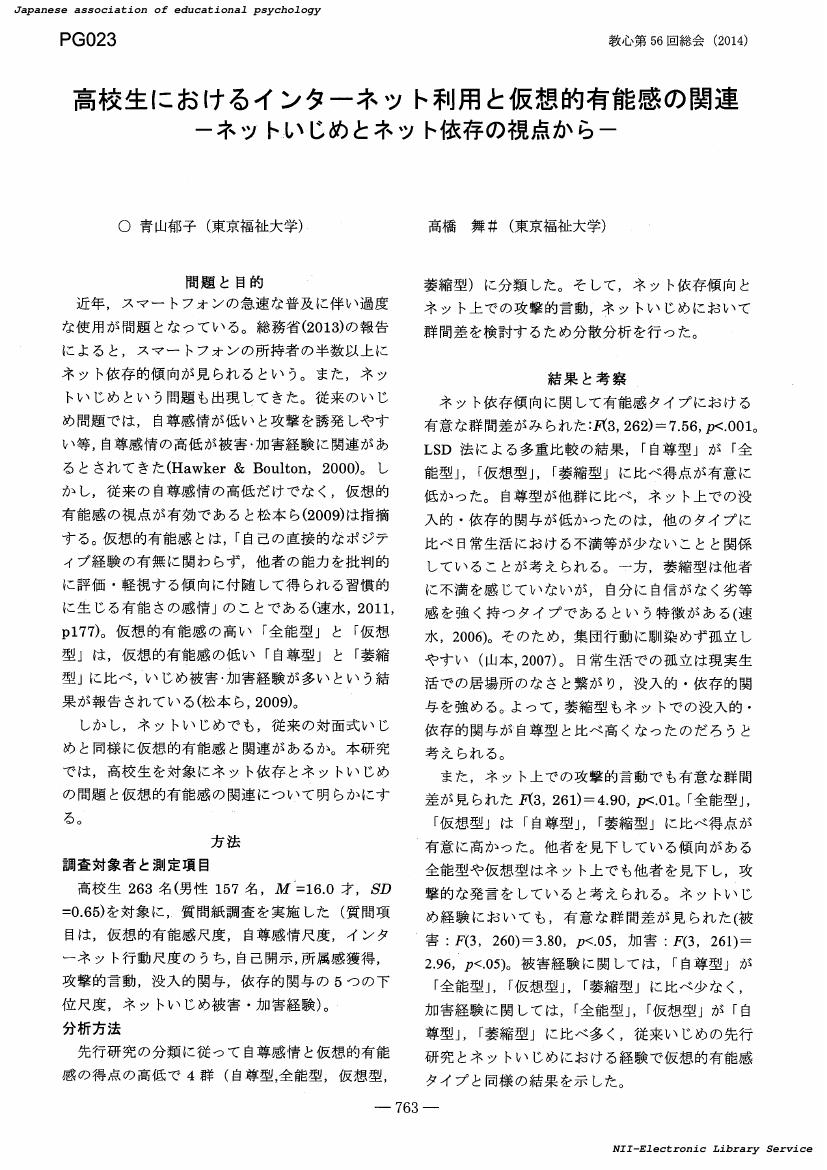3 0 0 0 OA 大学生におけるインターネット依存傾向,攻撃性, 仮想的有能感の関連
- 著者
- 青山 郁子 高橋 舞
- 出版者
- 日本教育工学会
- 雑誌
- 日本教育工学会論文誌 (ISSN:13498290)
- 巻号頁・発行日
- vol.39, no.Suppl, pp.113-116, 2016-01-25 (Released:2016-02-12)
- 参考文献数
- 15
本研究は, 大学生のインターネット依存傾向,ネット上での攻撃性を,「他者の能力を批判的に評価・軽視する傾向に付随して得られる習慣的に生じる有能さの感情」である仮想的有能感の視点から検討したものである. 大学生176名(男性56名, 女性120名, M=19.51歳, SD=.80)を対象に, 仮想的有能感, 自尊感情, インターネット行動尺度(攻撃的言動, 没入的関与, 依存的関与)を測った. その後, 仮想的有能感と自尊感情それぞれの尺度の高低から4群に分類し, インターネット行動について群間差が見られるかどうか検討した. 結果は, ネット上での攻撃的言動では有意差が見られなかった. 没入的・依存的関与ではともに, 自尊型< 仮想・萎縮型となった. 依存的関与に関しては自尊型と全能型の間にも有意差がみられた.
1 0 0 0 OA 録音分析に基づく演奏様式の検証―バッハ鍵盤作品における「修辞学的演奏様式」の変遷
- 著者
- 高橋 舞
- 出版者
- 文化資源学会
- 雑誌
- 文化資源学 (ISSN:18807232)
- 巻号頁・発行日
- vol.20, pp.5-23, 2023 (Released:2023-07-14)
- 参考文献数
- 28
1980年代になると、ニュー・ミュージコロジーによって音楽学の研究テーマは多様化され、これまで作曲家や作品の影に隠れていた「演奏」も研究対象となる。それと平行して、1990年代頃から作曲家による楽譜そのものを「作品」と考える「作品観」が変化したことから、録音分析による演奏研究が発展した。特に2004年に設立された、録音の音楽学的研究を促進するための研究センターThe AHRC Research Centre for the History and Analysis of Recorded Music(CHARM)において、コンピュータ・ソフトウェアを用いた録音分析が活発に行われてきた。これまでの録音分析の成果から、演奏様式が20世紀前半に大きく変化することが認識されるようになった。1920年代までの初期の録音に残されている、急激な速度変化を特徴とする演奏様式こそは、18世紀末からのピアノ演奏理論書において受け継がれてきた「修辞学的演奏観」に基づいた「修辞学的演奏様式」である。一方で、1920年代以降の演奏様式の変遷については、見解が分かれている。また、これまでの録音分析は、作品の特定の構造に依存して行われることが多く、客観的な分析手法が開発されてきたとは言い難い。そこで本論文では、速度偏差と録音間速度相関に着目した、より客観的でかつ汎用性の高い分析手法を提案する。そして、その新たな手法をJ. S. バッハの《半音階的幻想曲とフーガ》BWV903と《平均律クラヴィーア曲集》第1巻第1番BWV846の前奏曲およびフーガの3作品の、1912年から2019年までの54種類の録音資料から計79種類の録音データに対して適用し、1920年代以降の演奏様式の変遷を検証した。その結果、1920年代以前は1930年代以降と比較すると、速度偏差が有意に大きく、「修辞学的演奏様式」であることが確認できた一方で、「修辞学的演奏様式」と類似した演奏形式は、1930年代から2010年代までほとんど常に見られ、選択可能なアプローチとして存在していたことが明らかになった。
- 著者
- 青山 郁子 高橋 舞
- 出版者
- 一般社団法人 日本教育心理学会
- 雑誌
- 日本教育心理学会総会発表論文集 第56回総会発表論文集 (ISSN:21895538)
- 巻号頁・発行日
- pp.763, 2014-10-26 (Released:2017-03-30)
1 0 0 0 OA 他者と「出会う」地平 理解の超越と理解の暴力性に関しての一考察
- 著者
- 高橋 舞
- 出版者
- 教育哲学会
- 雑誌
- 教育哲学研究 (ISSN:03873153)
- 巻号頁・発行日
- vol.2003, no.87, pp.46-66, 2003-05-10 (Released:2010-05-07)
- 参考文献数
- 51
This paper clarifies the mechanism of “meeting”, and defines the role of education for preparing human beings for rich possibilities in “meeting”.O. F. Bollnow regards “meeting” as an accidental gift which defies any methodological treatment in education. At the same time, he attaches educational significance to “self-revelation” as provided by “meeting”. On the basis of contemporary issues of “independence from colonialism”, the author will take up another feature of “meeting”, that is, the educational significance of the “existence of others”. Moreover, the author will examine “meeting” from the point of view of human responsibility, by asking a question : “Why do human beings often fail to meet in day-to-day situations?” The failure to meet derives from the nature of “understanding”. While each language can give expression only to what transcend human sensibilities, human beings would understand “the other's” language within their own limited recognition. As a consequence, the “otherness” of “the other” does not emerge, thus hampering the “meeting”. Therefore, the author would like to suggest, first, that people become conscious of the limitations of languages, and exert their “control of understanding”.Second, by analyzing the cases of “meeting”, the author will examine the validity of the “control of understanding” as a useful tool for “meeting”. The analysis shows that the “meeting” ensues from “self-revelation” which Bollnow has found educationally significant. In order to highlight this process of “self-transformation”, the author will name it “self-metamorphosis”.Third, to provoke “self-metamorphosis”, one must understand “the other”. By meeting “the other” in the realm outside of one's understanding, one's understanding will be overthrown and be reversed. “Understanding” is necessary to “meet” the other, and those acts without understanding may turn into “violence”. At this point, the “control of understanding” and the “requirement of understanding” may strike some as inconsistent. In fact, both “understanding” and “less understanding” are violence, and the author will indicate that a life in the midst of such a dilemma will cultivate humanity which will promote rich possibilities in “meeting”.Finally, the author will criticize Bollnow's idea that the “meeting occurs only among the existences”. “The other” is the existence which goes beyond one's understanding, and which entails one's “self-metamorphosis”. Thus, Bollnow's idea of “the other” cannot be mere existences (without essential attributes). “The other” may either have its attributes or it may be merely existential. The author will insist that the open attitude to any possibility of “the other” holds an important role to play in education.
- 著者
- 青山 郁子 高橋 舞
- 出版者
- 日本教育工学会
- 雑誌
- 日本教育工学会論文誌 (ISSN:13498290)
- 巻号頁・発行日
- vol.39, pp.113-116, 2016
本研究は, 大学生のインターネット依存傾向,ネット上での攻撃性を,「他者の能力を批判的に評価・軽視する傾向に付随して得られる習慣的に生じる有能さの感情」である仮想的有能感の視点から検討したものである. 大学生176名(男性56名, 女性120名, M=19.51歳, SD=.80)を対象に, 仮想的有能感, 自尊感情, インターネット行動尺度(攻撃的言動, 没入的関与, 依存的関与)を測った. その後, 仮想的有能感と自尊感情それぞれの尺度の高低から4群に分類し, インターネット行動について群間差が見られるかどうか検討した. 結果は, ネット上での攻撃的言動では有意差が見られなかった. 没入的・依存的関与ではともに, 自尊型< 仮想・萎縮型となった. 依存的関与に関しては自尊型と全能型の間にも有意差がみられた.
1 0 0 0 OA 急激な身長増加を契機に診断された小児精巣Leydig細胞腫の一例
- 著者
- 小針 靖子 高橋 舞 高野 洋子 前田 昇三 牧野 武朗 悦永 徹 齊藤 佳隆 竹澤 豊 小林 幹男
- 出版者
- 北関東医学会
- 雑誌
- 北関東医学 (ISSN:13432826)
- 巻号頁・発行日
- vol.67, no.4, pp.353-357, 2017-11-01 (Released:2018-01-17)
- 参考文献数
- 16
急激な身長の増加と陰茎肥大を主訴に受診し, Leydig細胞腫と診断された5歳男児例を報告する. 初診時, 身長 128.0 cm (+4.95 SD), 体重 26.7 kg (+3.60 SD), 骨年齢9歳7ヵ月, 精巣容量右6 ml, 左4 ml, 陰茎長 9 cm, 血中testosterone 3.40 ng/mL, LH<0.10 IU/mL, FSH<0.20 IU/mLであり, ゴナドトロピン非依存性思春期早発症と診断した. エコーおよびMRIにて右精巣に腫瘤を認めた. 右高位精巣摘出術を施行し, 組織学的にLeydig 細胞腫と診断した. 摘出術後, 成長率は正常化し, testosterone値は測定感度以下に低下した.
1 0 0 0 IR 源泉徴収による所得税の自動確定論の問題点
- 著者
- 高橋 舞
- 出版者
- 龍谷大学
- 雑誌
- 龍谷大学大学院法学研究 (ISSN:13454544)
- 巻号頁・発行日
- vol.10, pp.45-70, 2008-07-31
